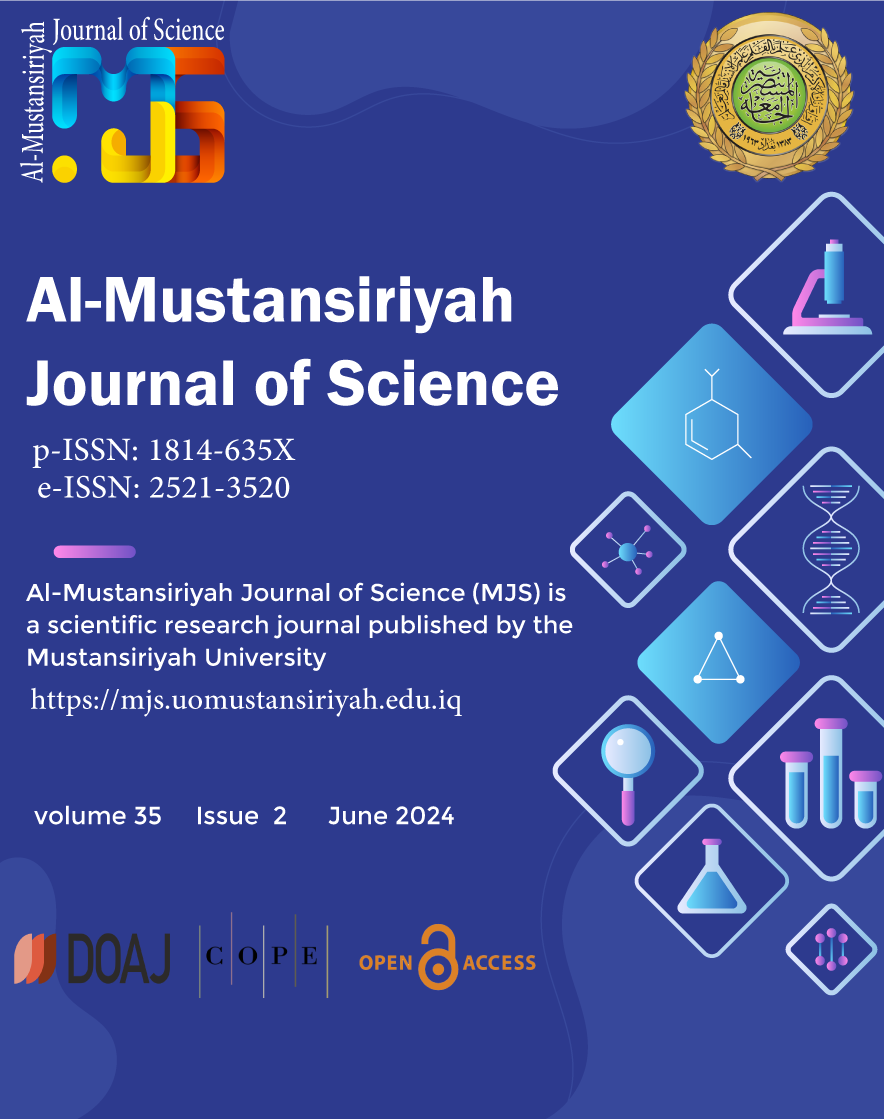The Effect of pH Variation on Antibiotic Susceptibility of MDR Klebsiella pneumoniae Isolates
DOI:
https://doi.org/10.23851/mjs.v35i2.1394Keywords:
Antimicrobial Agents, Antibiotic Susceptibility, Klebsiella pneumoniae, Multi-drug Resistance, pH stressAbstract
Background: Klebsiella pneumoniae is a significant opportunistic pathogen responsible for various nosocomial infections in humans. The emergence of multi-drug resistant strains poses a significant challenge in clinical settings, necessitating a deeper understanding of factors influencing antimicrobial resistance. Objective: This research aimed to investigate the impact of pH variation on the resistance patterns of multi-resistant K. pneumoniae isolated from Iraqi patients with urinary tract infections and wound infections against different antibiotics. Methods: Forty K. pneumoniae isolates were obtained from urine samples and wound swabs, and their identification was confirmed using the VITEK ® 2 compact system and molecular identification of the rpoB housekeeping gene. Antibiotic susceptibility testing was performed using the Kirby Bauer’s disk diffusion method under varying pH conditions (pH 5, 7, 9, and 11) at 37°C for 18 to 24 hours. Results: The study findings indicated that K. pneumoniae isolates exhibited differential susceptibility to antibiotics based on pH conditions. Cefotaxime demonstrated increased efficacy under alkaline pH, while tetracycline showed optimal efficacy under acidic conditions. However, ciprofloxacin displayed resistant phenotypes at acidic pH 5 and either resistant or intermediate phenotypes at alkaline pH 9. Conclusions: The results suggest a potential influence of pH on the antibiotic susceptibility profiles of K. pneumoniae isolates. Understanding the role of pH in antimicrobial resistance can inform strategies for better managing infections caused by multi-resistant pathogens. Further research is warranted to elucidate the underlying mechanisms and implications for clinical practice.
Downloads
References
H. J. Ahmed and A. R. Ganjo, "Detection of carbapenemase-producing klebsiella pneumoniae and escherichia coli recovered from clinical specimens in erbil city kurdistan region of iraq," Al-Mustansiriyah Journal of Science, vol. 30, no. 2, pp. 10-18, 2019.
A. Abdulzahraa, I. K. Al-Joofy, and I. N. Khelkal, "Characterization and antibacterial activity of purified microcin produced by klebsiella pneumoniae k15," International Journal of Biosciences, vol. 14, no. 1, pp. 146-155, 2019.
T. H. Hasan, S. Shlash, S. Jasim, E. F. Hussein, K. Alasedi, and A. Aljanaby, "The epidemiology of klebsiella pneumoniae: A review," Annals of the Romanian Society for Cell Biology, vol. 25, pp. 8848-8860, 2021.
A. Abdulzahraa, I. K. Al-Joofy, and I. N. Khelkal, "Evaluation of immunomodulatory activities of purified microcin produced by klebsiella pneumoniae in experimental animals," Journal of Research on the Lepidoptera, vol. 50, no. 2, pp. 32-39, 2019.
B. Aslam, M. H. Siddique, A. B. Siddique, M. Shafique, S. Muzammil, M. Khurshid, and A. ... Amir, "Distribution of mcr-1 harboring hypervirulent klebsiella pneumoniae in clinical specimens and lytic activity of bacteriophage kpnm against isolates," Infection and Drug Resistance, pp. 5795-5811, 2022.
M. F. Al-Marjani, S. Aziz, and I. Al-Kadmy, "Synergistic effects of combination indole and ciprofloxacin aantibiotic against persistence klebsiella pneumoniae isolates," in AIP Conference Proceedings, vol. 2386, 2022.
H. Nirwati, K. Sinanjung, F. Fahrunissa, F. Wijaya, S. Napitupulu, and T. ... Nuryastuti, "Biofilm formation and antibiotic resistance of klebsiella pneumoniae isolated from clinical samples in a tertiary care hospital, klaten, indonesia," BMC Proceedings, vol. 13, 2019.
T. H. Hasan and K. Alasedi, "A comparative study of prevalence antimicrobials resistance klebsiella pneumoniae among different pathogenic bacteria isolated from patients with urinary tract infection in al-najaf city, iraq," Latin American Journal of Pharmacy, pp. 174-178, 2021.
Y. Hao, Y. Jiang, H. Ishaq, W. Liu, W. Liao, P. Chen, and F. Yang, "Molecular characterization of klebsiella pneumoniae isolated from sputum in a tertiary hospital in xinxiang, china," Infection and drug resistance, vol. 15, pp. 3829-3839, 2022.
F. Zhang and W. Cheng, "The mechanism of bacterial resistance and potential bacteriostatic strategies," Antibiotics, vol. 11, no. 9, p. 1215, 2022.
A. R. Collaborators, "Global burden of bacterial antimicrobial resistance in 2019: A systematic analysis," Lancet, vol. 399, pp. 629-655, 2022.
P. K. Roy, A. J.-W. Ha, M. F. R. Mizan, M. I. Hossain, M. Ashrafudoulla, and S.-D. ... Ha, "Effects of environmental conditions (temperature, ph, and glucose) on biofilm formation of salmonella enterica serotype kentucky and virulence gene expression," Poultry Science, vol. 100, no. 7, p. 101 209, 2021.
A. Kincses, B. Rácz, Z. Baaity, O. Vásárhelyi, E. Kristóf, F. Somogyvári, and G. Spengler, "The relationship between antibiotic susceptibility and ph in the case of uropathogenic bacteria," Antibiotics, vol. 10, no. 12, p. 1431, 2021.
C. Vuotto, F. Longo, C. Pascolini, G. Donelli, M. P. Balice, M. F. Libori, V. Tiracchia, A. Salvia, and P. E. Varaldo, "Biofilm formation and antibiotic resistance in klebsiella pneumoniae urinary strains," Journal of applied microbiology, vol. 123, no. 4, pp. 1003-1018, 2017.
CLSI, "Performance standards for antimicrobial susceptibility testing, 32th edition.," 2, 2022.
A. Dashti, M. Jadaon, A. Abdulsamad, and H. Dashti, "Heat treatment of bacteria: A simple method of dna extraction for molecular techniques," Kuwait Medical Journal, vol. 41, 2009.
I. M. M. Alansary and N. A. Al-Saryi, "Detection of biofilm formation in classical and hypervirulent klebsiella pneumoniae," Al-Mustansiriyah Journal of Science, vol. 33, no. 5, pp. 65-71, 2023.
L. Yang, K. Wang, H. Li, J. D. Denstedt, and P. A. Cadieux, "The influence of urinary ph on antibiotic efficacy against bacterial uropathogens," Urology, vol. 84, no. 3, 731.e1-731.e7, 2014.
M. B. Jalil and M. Y. N. Al Atbee, "The prevalence of multiple drug resistance escherichia coli and klebsiella pneumoniae isolated from patients with urinary tract infections," Journal of clinical laboratory analysis, vol. 36, no. 9, e24619, 2022.
V. Ballén, Y. Gabasa, C. Ratia, R. Ortega, M. Tejero, and S. Soto, "Antibiotic resistance and virulence profiles of klebsiella pneumoniae strains isolated from different clinical sources," Frontiers in Cell and Infection Microbiology, vol. 11, 2021.
A. L. Flores-Mireles, T. E. Olivera-Flores, A. Camacho-Ortiz, and C. Gonzalez-Espinosa, "The role of biofilms in urinary tract infections," Journal of Microbiology and Biotechnology Research, vol. 6, no. 2, pp. 680-685, 2014
I. L. Bartek, M. J. Reichlen, R. W. Honaker, R. L. Leistikow, E. T. Clambey, and M. I. ... Voskuil, "Antibiotic bactericidal activity is countered by maintaining ph homeostasis in mycobacterium smegmatis," mSphere, vol. 1, no. 4, e00176-16, 2016.
Downloads
Key Dates
Received
Revised
Accepted
Published
Data Availability Statement
None
Issue
Section
License
Copyright (c) 2024 Fatima J. Hassan, Intesar N. Khelkal, Mohammed F. Al Marjani, Amira A. Moawad

This work is licensed under a Creative Commons Attribution 4.0 International License.
(Starting May 5, 2024) Authors retain copyright and grant the journal right of first publication with the work simultaneously licensed under a Creative Commons Attribution (CC-BY) 4.0 License that allows others to share the work with an acknowledgement of the work’s authorship and initial publication in this journal.






















